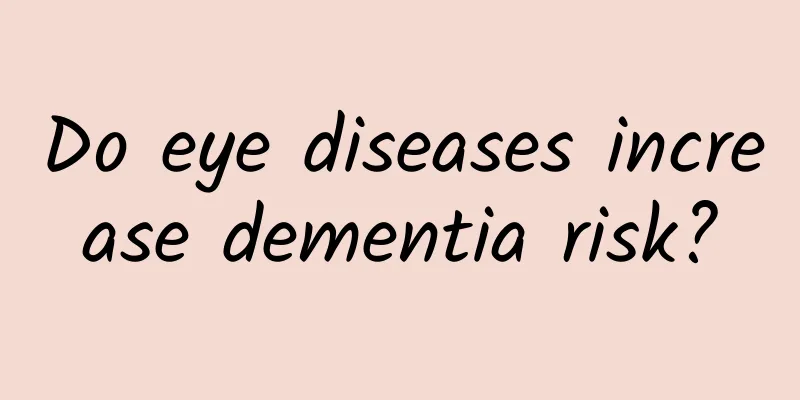Do eye diseases increase dementia risk?

|
This is the 4757th article of Da Yi Xiao Hu Recently, a large number of academic articles have revealed that eye diseases increase the risk of dementia? Is this conclusion reliable? How are eye diseases related to dementia? Certain eye conditions, including age-related macular degeneration (AMD), cataracts and diabetes-related eye disease, may be associated with an increased risk of dementia, suggests a study published in the British Journal of Ophthalmology. The observational study included more than 12,300 participants aged 55 to 73, some of whom had been diagnosed with AMD, cataracts, diabetes-related eye disease, or glaucoma. Initial evaluations were conducted between 2006 and 2010, with follow-up evaluations conducted regularly until 2021. During the study, 2,300 participants developed dementia. According to the research, the results are as follows:
Although glaucoma was not directly linked to an increased risk of Alzheimer's disease, the study did find a correlation between glaucoma and vascular dementia, a type of dementia that often develops after a stroke. The researchers also found that people who were diagnosed with multiple eye conditions, as well as those who had eye conditions in addition to systemic illnesses such as diabetes, stroke or a history of heart disease, had a higher risk of developing dementia. Coincidentally, another study published in the Journal of the American Medical Association (JAMA) Ophthalmology showed that vision loss in the elderly over 71 may be related to dementia. Researchers at the University of Michigan analyzed data from nearly 3,000 American citizens over the age of 71. This larger study tested the participants' vision and recorded their scores for near vision, distance vision, and their ability to distinguish objects against different backgrounds. They found that participants with vision loss were more likely to develop dementia than those without vision problems. Vision problems, and sometimes even vision loss, can be one of the first symptoms of dementia, and according to research, dementia progresses faster when the visual pathways are not stimulated. Dementia often causes vision problems that can affect daily life, including:
If these behaviors are noticed, an eye exam can help determine if an eye condition is the root of these difficulties. Therefore, vision management is a way to reduce the risk of dementia. Author: Zhongshan Hospital Affiliated to Fudan University Shen Jun, deputy chief nurse Gu WenbingAttending Physician |
<<: What happened to those people who always wore false eyelashes?
>>: How can elderly friends stay away from influenza?
Recommend
Beware! Being thin in old age does not equal living longer in old age! If you want to be healthy in old age, you should pay attention to your diet →
It is said that money cannot buy slimness in old ...
Can I eat bean dregs during menstruation?
Menstruation is a reflection of women's repro...
How long after a CT scan can I breastfeed?
The radiation intensity required for general CT s...
How to prevent pregnancy during menopause
The so-called menopause generally refers to a sta...
Are you more suitable for drinking milk or soy milk? 10 similarities and 10 differences between them
The Chinese Dietary Guidelines 2022 recommends dr...
What are the health products for women to nourish the kidneys?
As people's living environment in modern soci...
Exploring clinical research recruitment: How to join this "medical exploration journey"?
This is the 5377th article of Da Yi Xiao Hu...
Sweet potato soup is indispensable in winter! It nourishes, clears away heat and soothes the throat
What I like most in winter is hot food. Many wome...
At what age do women reach their sexual peak?
Sexual intercourse is a condiment between husband...
What are the dangers of staying up late during menstruation?
Modern work inevitably requires staying up late a...
What are the benefits of eating ginseng?
Ginseng is a relatively precious Chinese medicina...
Has anyone ever had cervical polyps?
There are many gynecological diseases in clinical...
What causes bright red bleeding during intercourse?
Anyone who has had sexual intercourse knows that ...









